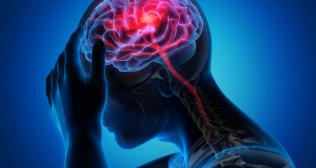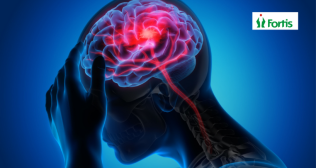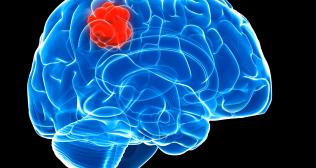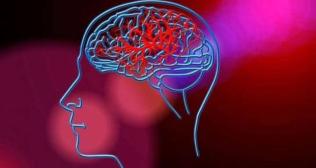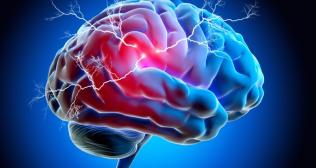
Blood Clot In The Brain

Formation of blood clots in brain is not uncommon. Clots in the brain are frequently caused by injury to the vessels in that area. Symptoms of blood clots include dizziness, difficulty in speech, lack of coordination, headaches to name a few. These signs indicate that you should seek prompt medical attention. A blood clot in the brain can cause an Ischaemic stroke - a stroke that is caused by an artery to the brain becoming blocked and starving a portion of the brain of oxygen and nutrients. It can also cause a build up of cellular waste and carbon dioxide because the brain will be unable to clear this waste properly. This can cause the cells around the blockage to die, and the neurons in this portion of the brain to stop working, which can cause damage throughout the body. If you suspect that you have a blood clot in the brain, immediate treatment will be necessary to avoid a life-threatening condition.
Causes of blood clots in the brain
Head injuries or trauma: Head and neck injuries can cause clots to form in the brain. Blood clots in the brain are caused when bleeding occurs between the skull and the brain. The body will form a clot to stop the bleeding, which will put pressure on the surrounding brain tissue. Trauma to the head can also cause blood clots outside of the brain to break loose and become lodged in the brain, which can cause an ischaemic stroke.
Travelling clots: Travelling clots from other parts of the body will go to a blood vessel that leads to the brain, causing a blockage that can lead to an embolic stroke or cerebral embolism. These travelling clots are more likely to cause damage to other parts of the body before they reach the brain.
Narrowing or hardening of the arteries: Commonly known as atherosclerosis, this can increase someone's vulnerability to developing a clot in the brain. Hardened arteries are at risk of tearing as they pump blood, which can cause a clot to form in the damaged area.
Inflammation of a superficial vein: This can also cause an increased risk of blood clots. A bacterial infection in the vein can also cause this type of inflammation which will reduce blood flow to the surrounding area. These damaged areas will be at a higher risk for leaking, which will result in a blood clot.
Women who use oral contraceptives: Women, who have a history of blood clotting, are over the age of 35 or smoke and continue to use contraceptives, have an extremely high risk of developing blood clots, which should be addressed by your doctor.
Symptoms of blood clots in the brain
There are a variety of symptoms one may experience when having blood clots in brain, ranging from headaches to difficulty speaking, depression and Ischaemic Attack.
Headaches: Headaches, associated with a blood clot, will normally be found on one side of the head. These can be worsened by coughing or sneezing and can impair head movement or physical activity over time.
Speaking difficulties: You may begin to slur your words or have difficulty while speaking. This is especially prominent if you have a clot on the left side of the brain.
Confusion: It may feel as though it takes longer to think, or your thinking capacity is not as it should be. You may feel confused or feel as though it takes longer than usual to understand things.
Changes in personality: A blood clot can change your personality. You may suddenly feel very manic. Sometimes normally energetic people can feel subdued.
Dizziness: Bouts of dizziness may occur from time to time. This may be accompanied by temporary blindness.
Depression: Those, who suddenly develop depression, are frequently checked for blood clots in the brain to ensure that all portions of the brain are getting the right amount of oxygen.
Loss of coordination: You may find yourself unable to move with the same level of coordination that you used to. The ability to transfer objects from one hand to the other may be especially affected.
Seizures: Seizures caused by a blood clot can last up to two minutes. Those that last longer may be a sign of a more serious condition.
Paralysis: One side of your body may suddenly become paralyzed if you are suffering from a blood clot. The arm, leg and face will be especially affected by this.
Ischaemic attack: This is also known as a ‘mini-stroke’, which will cause dysfunction on one side of the body. If this condition escalates, it can become a full stroke.
Diagnosis & treatments
MRI or CT scan are the tests required to diagnose presence of a clot and the condition which caused it to appear. If you suspect that you have a clot in your brain, it is vital that you seek medical attention right away. Anti-coagulants such as aspirin can often be used to dissolve the clot. The patient may also be placed on an aspirin regimen to prevent the appearance of new clots. Do not take anti-coagulants if you are at risk for hypertension as this can interfere with your regular medication. In some cases, a clot needs to be surgically removed from the brain. Arteries can also be opened and scraped clean of plaque to reduce the risk of additional injury. Patients at risk for developing additional clots may have a tissue plasminogen activator inserted in a vein. This will release clot-busting drugs directly to the brain to stop a stroke from occurring.
At Fortis Healthcare, best hospital in India we offer comprehensive care for individuals experiencing symptoms of a blood clot in the brain. Our expert team specializes in diagnosing and treating brain clots using advanced techniques, including both surgical and non-surgical interventions. Whether it's identifying the underlying causes or utilizing innovative methods to dissolve clots without surgery, we are dedicated to providing personalized and effective treatment options to ensure the best possible outcomes for our patients.
Popular Searches :
Hospitals: Cancer Hospital in Delhi | Best Heart Hospital in Delhi | Hospital in Amritsar | Hospital in Ludhiana | Hospitals in Mohali | Hospital in Faridabad | Hospitals in Gurgaon | Best Hospital in Jaipur | Hospitals in Greater Noida | Hospitals in Noida | Best Kidney Hospital in Kolkata | Best Hospital in Kolkata | Hospitals in Rajajinagar Bangalore | Hospitals in Richmond Road Bangalore | Hospitals in Nagarbhavi Bangalore | Hospital in Kalyan West | Hospitals in Mulund | Best Hospital in India | | Cardiology Hospital in India | Best Cancer Hospital in India | Best Cardiology Hospital in India | Best Oncology Hospital In India | Best Cancer Hospital in Delhi | Best Liver Transplant Hospital in India
Doctors: Dr. Rana Patir | Dr. Rajesh Benny | Dr. Rahul Bhargava | Dr. Jayant Arora | Dr. Anoop Misra | Dr. Manu Tiwari | Dr. Praveer Agarwal | Dr. Arup Ratan Dutta | Dr. Meenakshi Ahuja | Dr. Anoop Jhurani | Dr. Shivaji Basu | Dr. Subhash Jangid | Dr. Atul Mathur | Dr. Gurinder Bedi | Dr. Monika Wadhawan | Dr. Debasis Datta | Dr. Shrinivas Narayan | Dr. Praveen Gupta | Dr. Nitin Jha | Dr. Raghu Nagaraj | Dr. Ashok Seth | Dr. Sandeep Vaishya | Dr. Atul Mishra | Dr. Z S Meharwal | Dr. Ajay Bhalla | Dr. Atul Kumar Mittal | Dr. Arvind Kumar Khurana | Dr. Narayan Hulse | Dr. Samir Parikh | Dr. Amit Javed | Dr. Narayan Banerjee | Dr. Bimlesh Dhar Pandey | Dr. Arghya Chattopadhyay | Dr. G.R. Vijay Kumar | Dr Ashok Gupta | Dr. Gourdas Choudhuri | Dr. Sushrut Singh | Dr. N.C. Krishnamani | Dr. Atampreet Singh | Dr. Vivek Jawali | Dr. Sanjeev Gulati | Dr. Amite Pankaj Aggarwal | Dr. Ajay Kaul | Dr. Sunita Varma | Dr. Manoj Kumar Goel | Dr. R Muralidharan | Dr. Sushmita Roychowdhury | Dr. T.S. MAHANT | Dr. UDIPTA RAY | Dr. Aparna Jaswal | Dr. Ravul Jindal | Dr. Savyasachi Saxena | Dr. Ajay Kumar Kriplani | Dr. Nitesh Rohatgi | Dr. Anupam Jindal |
Specialties: Heart Lung Transplant | Orthopedic | Cardiology Interventional | Obstetrics & Gynaecology | Onco Radiation | Neurosurgery | Interventional Cardiology | Gastroenterologist in Jaipur | Neuro Physician | Gynecologist in Kolkata | Best Neurologist in India | Liver Transfer |







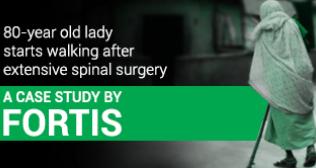
}}drupal-data/images/blog-lists.png)
